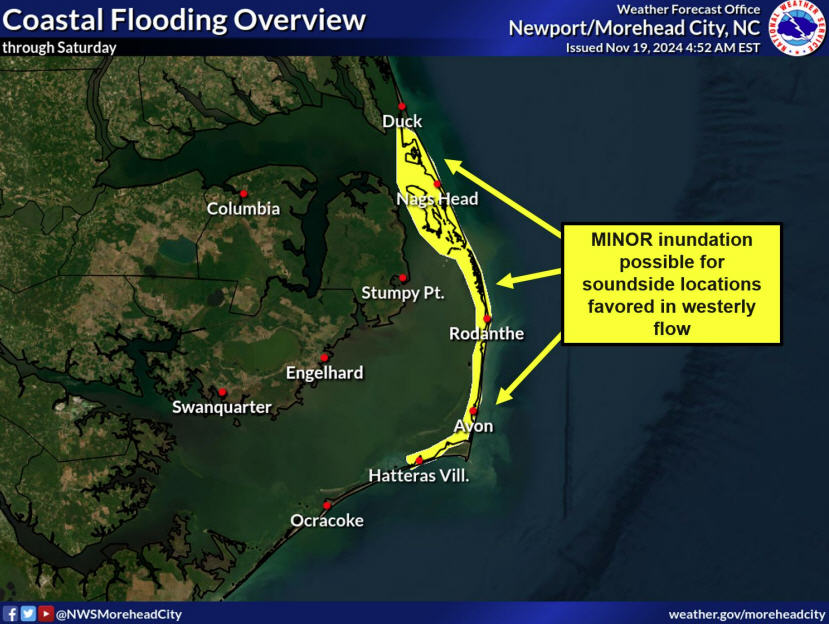Mosquitoes getting under control; no more aerial spraying planned
Mosquitoes getting under control; no more aerial spraying planned
BY CATHERINE KOZAK
BY CATHERINE KOZAK
BY CATHERINE KOZAK
A second and final aerial spraying followed by mercifully cooler temperatures on the Outer Banks appears to have ended one of the worst plagues of mosquitoes in memory.
“It was terrible,” Carl Walker, Dare County Vector Control Supervisor, said this week.
Before last weekend’s spraying, there were 200 mosquito landings counted per minute on a well-covered human target. Right after, landings went down to 15 per minute.
Dare County will continue its routine mosquito control efforts, including the use of larvacides, until a cold snap finishes the pests off, Walker said.
In the weeks after Hurricane Irene, Walker said, his office voice mail was overflowing with so many complaints about the aggressive biters that “I could have been here for six months and not have answered all those calls.
“They were calling to cuss me. Now they’re calling me to thank me.”
In one 12-hour period before the initial spraying, Walker said, traps filled with dry ice that attract the insects captured about 24,000 of them in just South Nags Head and Manns Harbor.
“We had so many mosquitoes, we weighed them,” he said. “It was unheard of. It was just something we had never seen.”
Walker said that when the tides rose to record levels as Irene moved off the Outer Banks in August, followed by days of heavy rain in September, the water allowed thousands of long-dormant mosquito eggs to hatch.
“The moment I saw the tides,” he said, “I knew we were in trouble.”
The numbers were too overwhelming to address with the usual mosquito control methods, a combination of larvacide and regular spraying from a truck. Both use pesticides with mild toxicity.
Walker said that some callers were concerned about the health and environmental hazard of spraying a moderately toxic pesticide over a 50-mile radius.
The county used Dibrom, an organophosphate that can be hazardous to wildlife and beneficial insects, and is associated with side effects in humans, including nervous system disorders and skin irritation. But most callers, he said, were demanding the county get rid of the pests.
“The thing about mosquitoes, you’re going to have people who want to spray; you’re going to have people who don’t want you to spray,” he said. “Whichever way you go, somebody’s not going to like what you do.”
But since mosquitoes carry West Nile virus and other diseases, as well as creating safety hazards, the county had no choice but spraying to eliminate the overwhelming infestation.
No adjacent state or federal lands were allowed to be sprayed.
While not dismissing the concerns about aerial pesticide spraying, Walker said that 80 percent of the product never reaches the ground. Rather, it is focused on killing the adults flying around, which is why it is done at night when the largest numbers are out. The other 20 percent of the product, he said, dissipates quickly after the sun comes up.
Field tests were done prior to spraying to determine what stage the larvae was at, with the goal of hitting them just as they hatch, and before more eggs were laid.
Walker said the first spraying was not timed as precisely as the second spraying, which was right on the mark.
With the state vector control office cut by state legislators, Walker said his office had to work overtime to do its own insect trapping and landing counts.
Edward Mann, the Dare County’s public works director, said that the county is expecting to be reimbursed by FEMA for the estimated $200,000 total cost of aerial spraying.
The last time the county did aerial spraying was after Hurricane Isabel in 2003.
Mann said he has had overwhelmingly positive feedback from the public about the spraying, and very few complaints.
“I’ve heard from one or two people,” he said about objectors. “But I’ve heard from about 100 times that amount how good it’s been.”
Subject
Name
(required, will not be published)
(required, will not be published)
City :
State :
Your Comments:
May be posted on the Letters to the Editor page at the discretion of the editor.
May be posted on the Letters to the Editor page at the discretion of the editor.
May be posted on the Letters to the Editor page at the discretion of the editor.
May be posted on the Letters to the Editor page at the discretion of the editor.












